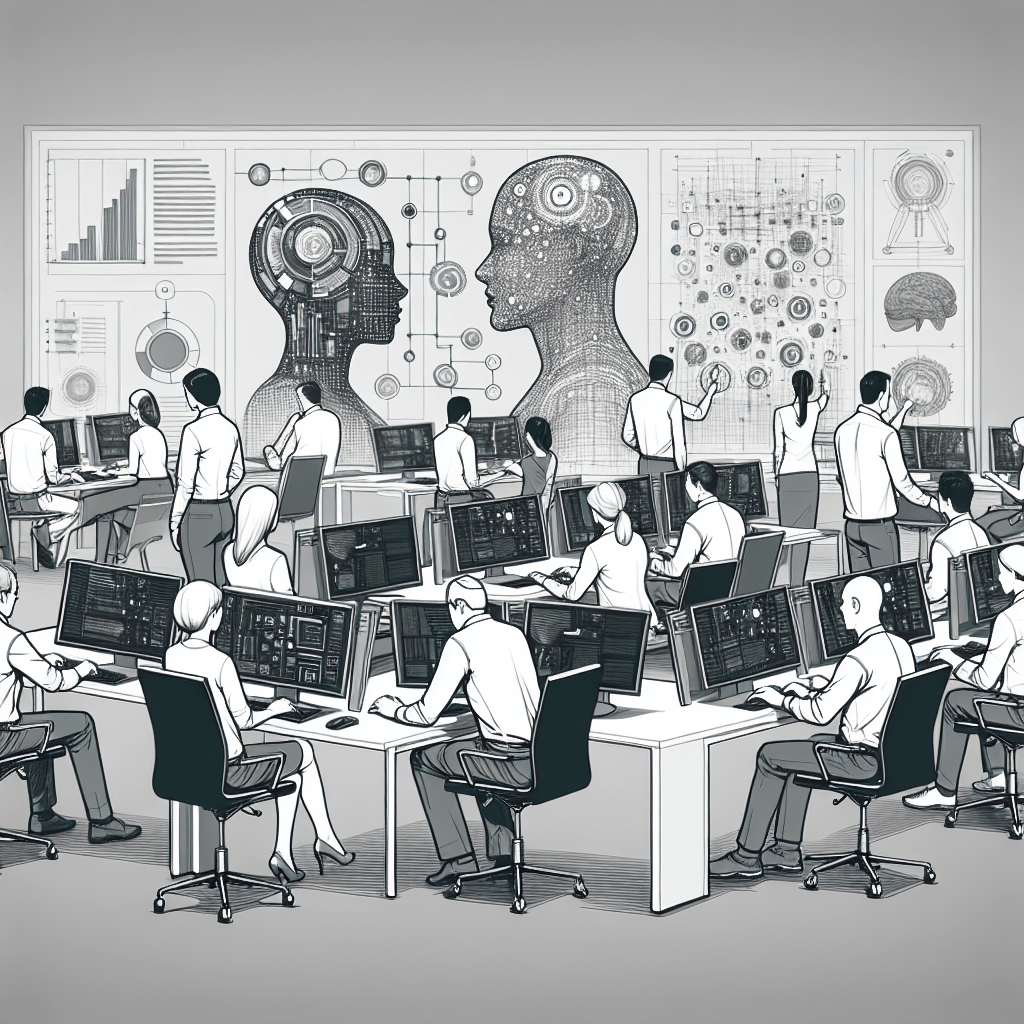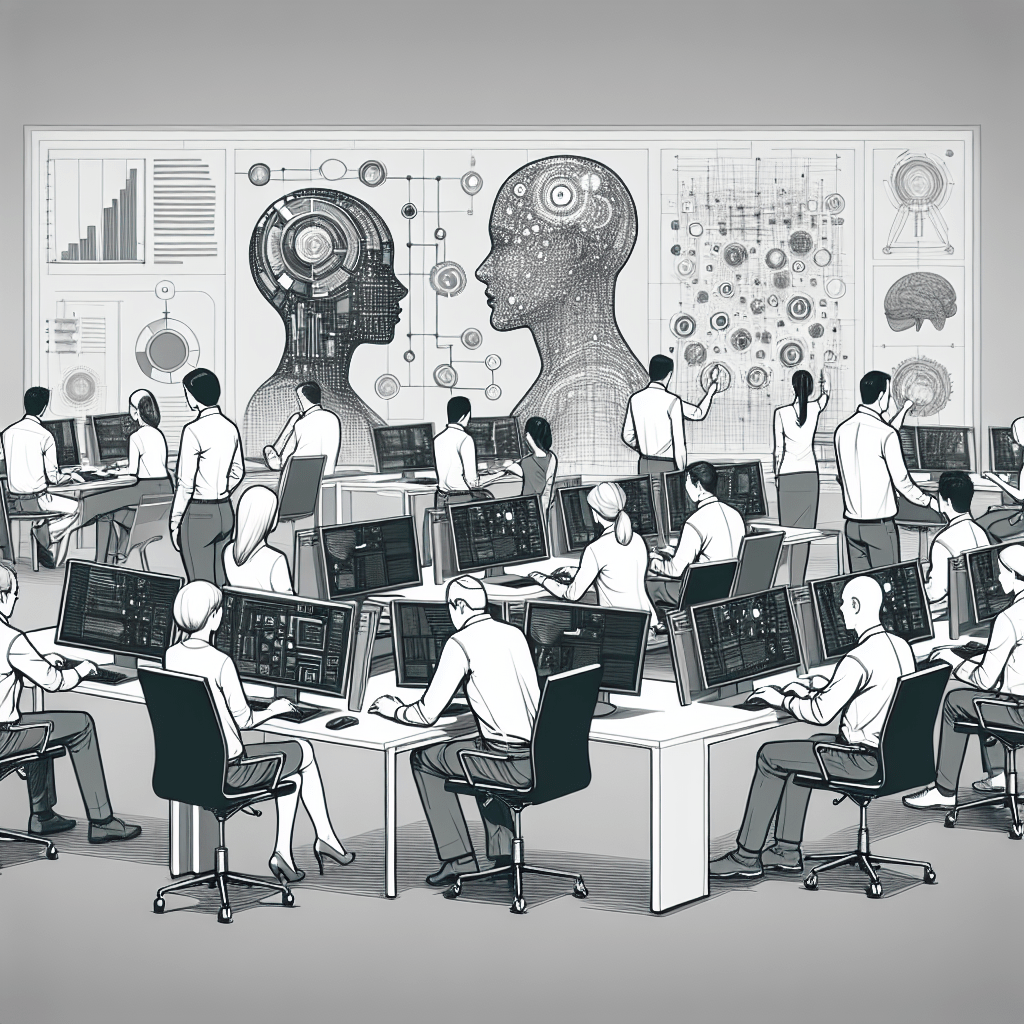
Introduction: The Impact of AI on Employment
The impact of AI on white-collar jobs is becoming increasingly evident, with various reports and studies highlighting the potential for job displacement and transformation. According to a recently published article, there is growing evidence that AI applications pose a real and present danger to jobs previously considered irreplaceable by automation. The move towards generative AI, which can autonomously generate conclusions and make decisions based on data analysis, highlights the changing landscape of office work.
Although companies do not always explicitly state direct links between AI deployment and layoffs, the underlying trend suggests a shift towards downsizing in favour of AI investments. A UN study indicates that a significant share of global employment in white-collar work could be affected, with many employees already seeing an increase in their use of AI tools to improve productivity. According to a survey mentioned in the article, a significant percentage of companies expect AI to lead to layoffs by 2024.
A recent report highlights that the ability of generative AI to understand and generate content is likely to specifically affect white-collar jobs involving routine digital tasks, such as simple coding. This shift could lead to overstaffing and require job reductions in certain areas, even if it does not always mean outright layoffs.
The same report suggests that while some jobs will become more productive with the help of AI, reducing demand for human labour in those roles, it could also increase demand for workers with expertise in relationship building and emotional intelligence, areas where AI cannot fully replicate human capabilities.
These benchmarks suggest a complex future for white-collar employment, where the integration of AI into the workplace could both displace certain positions and create new opportunities for those who are able to adapt and retrain in response to changing labour market demands.

Blue Collar AI Trainers, White Collar Unemployed
The future of work in the context of rapid advances in generative AI, especially with the displacement of white-collar jobs, is a complex and multifaceted issue. The integration of AI into various sectors is bringing about significant changes in the labour market, with challenges and opportunities.
Generative AI, with its ability to automate complex tasks such as writing, programming, data analysis and even certain creative jobs, poses a clear challenge to traditional white-collar positions. Jobs that involve routine tasks or that can be easily coded are most at risk of being automated. However, this automation also opens up new opportunities for jobs that require a human touch, including emotional intelligence, ethical judgement and creative thinking that AI cannot replicate.
As AI systems become more sophisticated, the need grows for AI trainers or coaches who can teach these systems to perform specific tasks, understand context or even show empathy in interactions. This role involves:
- Data annotation and model training: providing detailed annotations of data that can be used to train AI models. This requires a deep understanding of the specific domain in which the AI operates.
- Feedback and improvement: Continuously monitor AI performance and provide feedback to improve accuracy and relevance.
- Bias mitigation and addressing ethical issues: Ensure that AI systems operate within ethical boundaries and make adjustments to reduce biases.
Opportunities for workers displaced by AI
Workers displaced by AI in white-collar jobs may find new opportunities as AI Coaches, leveraging their sector-specific knowledge. For example:
- Legal professionals could train AI systems in understanding and interpreting legal documents.
- Doctors could help train AI to diagnose diseases or recommend treatments based on patient history.
- Journalists and writers could help teach AI to create engaging, accurate and contextually appropriate content.
While the idea of retraining workers as AI Trainers is promising, there are several challenges and considerations:
- Training and education: Workers will need access to training programmes that help them acquire the skills necessary to become effective AI trainers.
- Quality assurance: Ensuring the quality of AI outcomes remains a major concern, requiring continuous human oversight.
- Ethical considerations: As AI becomes more prominent, ethical considerations, such as privacy, consent and the potential for misuse, become increasingly important.
Becoming an AI Trainer
The transformation of the labour market by generative AI is inevitable, but it also presents an opportunity to redefine the value that human workers bring. By focusing on roles that harness human creativity, ethical judgement and domain-specific expertise, displaced workers can find new avenues of employment as AI trainers. Governments, educational institutions and businesses will need to work together to provide the necessary infrastructure, training and ethical guidelines to support this transition.
Becoming an effective AI trainer requires a combination of technical, industry-specific and soft skills among which we could highlight the following:
- Technical competence in AI and machine learning: Understanding the fundamentals of AI, machine learning algorithms, data pre-processing and model evaluation is crucial. This includes familiarity with programming languages such as Python, frameworks such as TensorFlow or PyTorch and tools for data analysis and visualisation.
- In-depth knowledge of the specific domain in which AI is applied is essential. This could be healthcare, finance, law, etc. Understanding the nuances, challenges and complexities of the specific domain allows trainers to better tailor AI training processes and datasets to produce more accurate and relevant results.
- Data literacy: AI trainers must be adept at data management, collecting, cleaning, annotating and understanding datasets. This also includes the ability to identify biases in the data and mitigate them to ensure that the results of the AI system are fair and unbiased.
- Critical thinking and problem solving: The ability to critically evaluate AI performance, identify problems and devise strategies to improve model accuracy and efficiency is key. This includes problem solving, experimentation with different approaches and continuous refinement of training methods.
- Communication and collaboration: Effective communication skills are needed to translate complex AI concepts into terms understandable to stakeholders. Collaboration with data scientists, developers, domain experts and other team members is essential to the iterative process of training and improving AI models.
- Ethical understanding and responsibility: Knowledge of ethical considerations, privacy issues and regulatory compliance related to AI applications. AI trainers must be able to navigate the ethical implications of AI technologies and ensure that AI systems are developed and used responsibly.
- Continuous learning: The field of AI is evolving rapidly, so it is vital to keep up to date with the latest technologies, methodologies and best practices. This includes participating in industry courses, workshops and conferences.
Adaptability: The ability to adapt to new tools, technologies and changes in the AI landscape. Flexibility in learning and applying new methods and approaches is crucial, as technology and its applications continue to evolve.
For professionals transitioning from other white-collar jobs to AI trainer roles, leveraging their specific knowledge and complementing it with technical AI skills can make them valuable assets in the era of generative AI. This transition can not only mitigate the displacement caused by AI, but also open up new avenues for professional growth and development in high-demand areas.
An enhanced Human or Human-Powered AI?
When we talk about the development, operation and maintenance of an AI, we move out of the software development lifecycle we knew; in the same way that when we talk about an AI trainer, we move out of the cycle of experimentation and re-training of our models that we were beginning to adopt in our data science and machine learning projects.
If we are already able to talk naturally about training an AI, it won’t be long before we are talking about teaching, training or “educating” an AI. We are also entering a self-reinforcing circuit in which we build and improve a series of technological artefacts, which we call artificial intelligences, mainly designed to increase the capabilities that we consider to be more “human”.
This process has led us to “displace” a growing number of humans who occupy “white-collar” job positions and who, curiously, in this logic of enhancement, were the target audience for those artificial intelligences that today make them redundant.
Faced with images of legions of precarious workers massively labelling data for the training of ML models, we are faced with a metaphor reminiscent of Escher’s impossible illustrations in which one hand draws the other hand reciprocally on the same notebook.

This logic seems to lead us to a scenario in which fewer and fewer humans are enhanced by an artificial co-driver; and more and more of those displaced humans will be enhancing an AI that will eventually be behind the wheel 😉
As that scenario materialises, what will an AI Trainer most resemble? Is it a mix of ML engineer and data scientist with a humanistic approach? Is it a human-machine translator that will be able to provide value connected to something very much like a platform for content “localisation”? A sort of AI Gym? A centre for “artificial contextualisation of intelligences”? An indoctrination centre, i.e. an educational centre? A handful of well-known dystopias come to mind…

